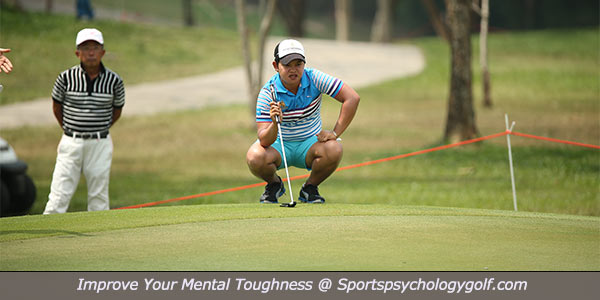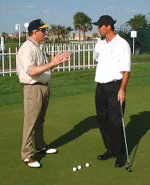
Avoid the All or Nothing Mindset
Exactly how do you define your performance in tournaments? Do you solely evaluate performances by wins and losses?
When you lose, do you usually point out everything you did poorly?
- “I sliced all my drives.”
- “I choked on the back nine.”
- “I couldn’t hit an iron shot to save my life.”
- “I pushed all my putts wide right.”
For many golfers, it all boils down to this… “I played well or I played horribly.” “I won or I lost.” There is no middle ground… It’s “either-or.”
The “either-or” evaluation produces an “either-or” emotional response. It’s called “all or none thinking:”
- EITHER you will feel happy OR dejected with your performance.
- EITHER you will feel confident OR doubtful about your abilities.
- EITHER you will commit to improving OR you will go through the motions.
The “either-or” mindset ignores any small successes or positives after a loss.
See if you can relate to a golfer who responded to our Mental Game of Golf Survey:
“How can I keep confidence up and not have negative thoughts about my ability?”
The short answer is to be objective when you evaluate your performance. When you bogeyed four holes in your last tournament and can’t seem to regain your form from the previous year, you probably focus on all the mistakes you made.
You replay each double-bogey in your mind over and over again. You question whether you still “have it.” You think, “Maybe last year was a fluke and I just got lucky.”
When you base your success on wins, your confidence will be all over the place. One or two mistakes will be all you need for your frustration to boil over and your play to spiral downward quickly.
Your confidence suffers when you dissect your game, point out everything you did badly, replay those images over and over in your mind and berate yourself for not winning.
When you lose, of course, you will be upset. That is because you care about your level of play. Being a little upset can help motivate you to improve your game.
To keep your confidence stable, you should take a more objective approach to evaluating your performances. You can keep your confidence intact by giving yourself credit for the positive aspects of your performance.
Recognizing the positives of your game contributes more to confidence than winning… You will lose or score poorly more often than win or shoot your best, but there is always some positive you can extract from a round of golf.
Confidence is on the rise for Justin Thomas despite finishing eight shots behind Dustin Johnson at the 2020 Masters.
Even though Thomas finished fourth (his best Masters finish), he wasn’t exactly happy with his play, but he was still able to find some positives about his performance.
THOMAS: “I mean, it was far from my best stuff. So to finish fourth with that is a positive. I mean, I keep getting better. I’m very confident I’m going to win around this place at some point… I just need to execute a little bit better. I didn’t hole anything the last three days, but I hit the ball beautifully yesterday. Like I hit it really solid. I didn’t hit it really close to the hole a lot, but the shots that didn’t go where I wanted, they still were hit really well, and I felt like they were good shots.”
Finding the positive helps keep confidence stable and motivates you to keep working on your game despite the results.
How to Stay Confident After Mistakes:
Avoid the all or none mindset trap. Look at your performance on a scale from 1-10. On most days golfers play between 6-8 out of 10.
Accept that you will not always have your A-game and assess the good with the bad. The most important part of your assessment is learning what you need to improve for the next round or tournament.
In addition, try to think about two things you did well after every round to help you keep your confidence.
Related Golf Psychology Articles
- Can You Accept a Difficult Round of Golf
- A Positive Mindset After Doubles
- How to Stay in the Present on the Course
- Subscribe to The Golf Psychology Podcast on iTunes
- Subscribe to The Golf Psychology Podcast on Spotify
Golf Mental Coaching Programs

All golf psychology programs include the Golfer’s Mental Aptitude Assessment (GMAP), a custom Mental Game Plan, weekly coaching sessions, unlimited email correspondence, and The Golfer’s Mental Edge 2.0 workbook program.
One-on-one mental coaching is the fastest and most effective method to improve your mental game, boost your performance, and make lasting changes!
We have unique mental coaching programs, customized for you. Please contact us with any questions your have about our programs. Provide your name, email, and role below:
Or Call us today at 888-742-7225 | Mental Game Success Stories